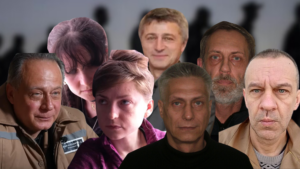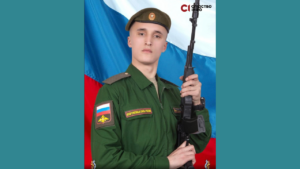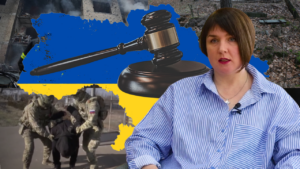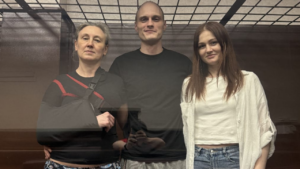Death Basement in Yahidne: the Court Started Hearing the Case on the Merits
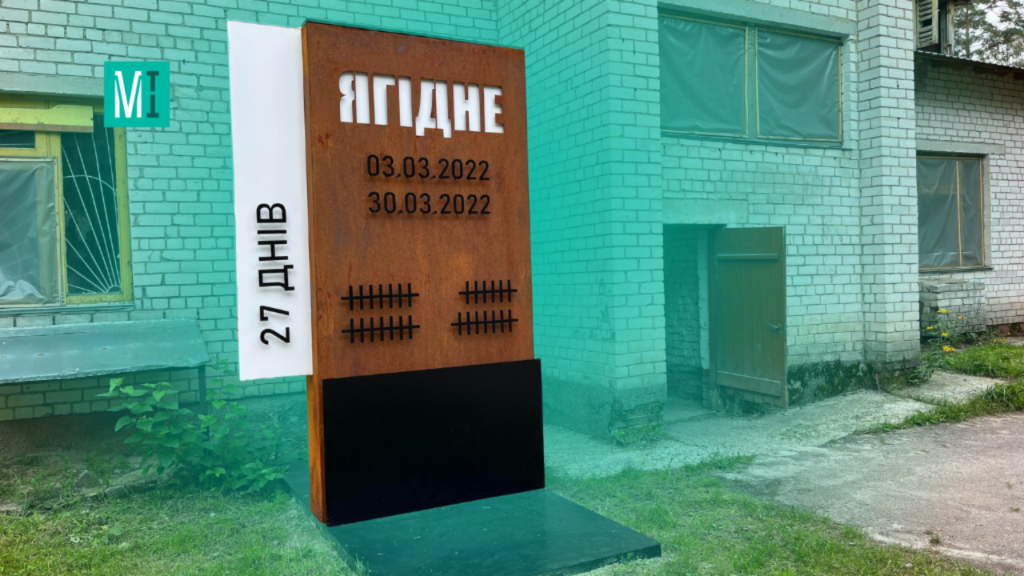
On August 3, Prosecutor Serhii Krupko announced an indictment in the case of holding captive almost all the residents of Yahidne Village in the local school basement. On that day Chernihiv District Court of Chernihiv City started hearing the case on the merits іn absentia. The MIHR journalists attended the session.
The Russians occupied the Village of Yahidne in Chernihiv Region last year, on March 3. They broke into houses, robbed, beat and stripped men searching for tattoos and forcefully herded people into the school basement. Thus, almost all the residents of the village, 368 persons, ended up in a dark space of 197 square meters. A half of square meter per person. 28 days in darkness and stuffiness, without medications and without adequate access to food and water.
Elderly people were dying of stuffiness. Their fellow-villagers report that they had lost their minds before dying. The dead were lying among the living because the Russians did not allow to bury them. Ten persons died in the “death basement” in Yahidne during that month.

The residents of Yahidne Village kept a calendar and lists of the dead and captive on the doors and walls of the school basement. Photo: MIHR
The prisoners of the Russians kept lists on the walls and doors: of those who have died and those who stayed in captivity. There are children’s drawings near the surnames, the Ukrainian anthem written by hand and the inscribed calendar.
“First the victims said that there had been 77 juveniles in the basement. However, we established 69. We started figuring out what caused such discrepancy. The people began to tell that they had said on purpose about the 18-year–old girls that they were 16–17 to keep the Russian militaries away from them,” says Prosecutor Serhii Krupko.
There is an episode in the case file when, in the evening of March 9, a Russian military came down to the basement “to satisfy his sex passion”. He tried molesting a woman, but her fellow-villagers defended her against the sexual violence.
The investigators identified 15 Russian militaries from Tyva, who were indicted:
- Suvan Siin-Ool
- Aygarim Mongush
- Nazyty Mongush
- Eres Oorzhak
- Arian Khertek
- Sayan Khomushku
- Oleksiy Borysov
- Buyan Dadar-Ool
- Sholban Dambar-Ool
- Dorzhu Demir-Ool
- Sain Kenden
- Vitaliy Mongush
- Arzhaan Saaya
- Buyan Dorzhu
- Amir Kendenov
Serhii Krupko tells that, during the first two weeks after de-occupation of Yahidne, the group of investigators lived in the village in order to acquire as much information as possible.
— We set up our hub in the school, in a classroom which was not destroyed. During the first week, we questioned about 200 persons and examined the basement, school and premises.
Mr. Krupko organized collection of the information and analyzed the received data. He says that there is a lot of physical evidence in the case, including but not limited to the documents left behind by the Russians when they retreated: orders of travel and of arms receipt, waybills, rucksacks, crossbelts with names, a military ID.

The school in the basement of which the Russian militaries forcefully held the residents of Yahidne. Photo: MIHR
The law enforcement officers listed the Russian militaries as accused if they were consistently recognized by the villagers. The investigators also checked the information against the Russian documents they found and against the traffics of the militaries’ telephone conversations, which confirmed that they had stayed in Yahidne.
“We were selecting and screening out militaries while collecting the evidence base,” says Krupko. “We carried out more than 300 identifications with different victims. Most of the victims did not recognize anybody, but there were also people who had seen one and the same accused person several times.”
The “death basement” case was classified as “violation of the rules and customs of war” under Article 28, Part 1 and Article 438, Part 1 of the Criminal Code of Ukraine. Fifteen Russian militaries are accused of illegal detention and imprisonment of civilians, tortures, holding them in inhumane conditions and using them as a “human shield”.
The Russians needed a “human shield” so that the Ukrainian troops wouldn’t destroy their command post, which was in the same school. Now the investigation works on identification of the Russian commanders who ordered to herd people into that place.
On its session of August 3, the court decided on how the case will be considered: first the court will examine the written and material evidence and then it will hear the victims. The 26 volumes of the case contain about 7,000 sheets. It will take several sessions just to examine the written evidence.

Prosecutor Serhii Krupko reads out the indictment during the court sessio. Photo: MIHR
Mykola Kashuba and Ihor Savytskyi, the defenders of the 15 Russians commissioned from the Center of Free Legal Aid, agreed to such procedure for consideration of the case. Mr. Kashuba called it reasonable. If proven guilty, the defendants will face 8 to 12 years of imprisonment, which they will serve after their detention.
Previously, Chernihiv Court had passed two sentences for the Russian militaries who had taken part in the terror in Yahidne. The MIHR journalists analyzed the sentences to understand the reasons for which the war criminals had got penalized and how the prosecution had proven their guilt.
Iryna Domashchenko, Journalist, MIHR



